Coronavirus at 100 days: Snapshot of how pandemic has changed life on a single UK street
There have been no known cases in Sheffield’s Lydgate Hall Crescent – yet the all-encompassing nature of the crisis means every household has still been inexorably affected. Colin Drury reports

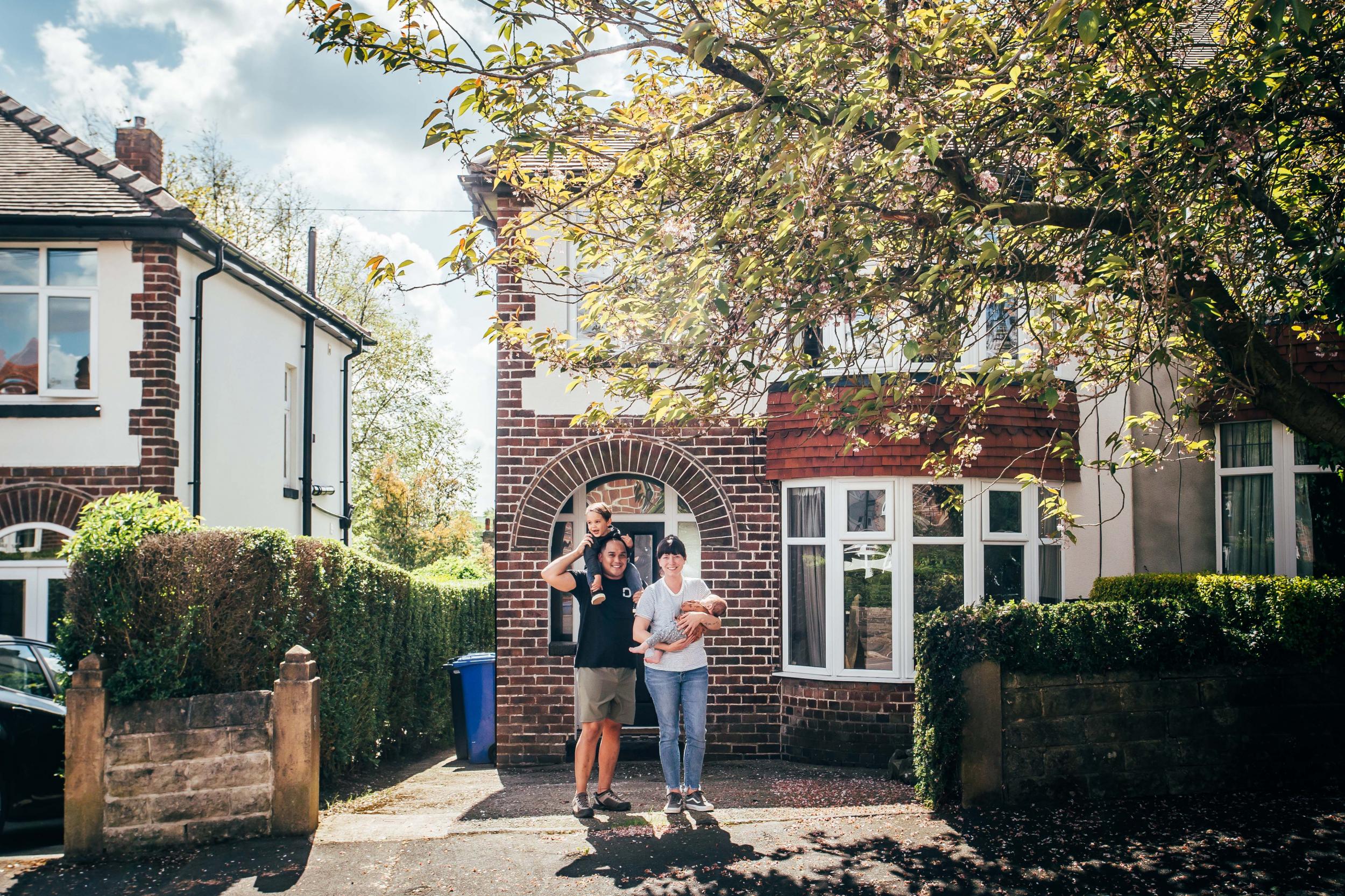
It is 100 days since the first coronavirus case was diagnosed in the UK, and in Lydgate Hall Crescent – a quiet street in suburban Sheffield – there is not a household that has been left unaffected.
Here, in this little 40-home road – so English it has a green at one end and a pub bordering the other – Covid-19 has taken no lives and, so far it seems, no jobs.
No one has been diagnosed with the bug.
Yet such is the pandemic’s all-encompassing nature that every single life in this street has been inexorably changed – from grandparents prevented from seeing grandchildren to A-level students suddenly unsure what their immediate future holds; from doctors and nurses working on the front line to those so vulnerable they have not ventured beyond their own garden for eight weeks.
Among residents here are the furloughed and the fearful, the helpers and the hopeful. One family has had to cancel a move to America. Many know of someone who has died.
None of which makes Lydgate Hall Crescent – home to Chinese, American, Swedish and Kuwaiti as well as British residents – especially unique. Rather, the road perhaps offers a typical glimpse of a new normal.
Today, as such, The Independent speaks to neighbours here to offer a one-street snapshot of the UK 100 days into this coronavirus age.
The intensive care consultant: ‘There was a sense of impending doom’
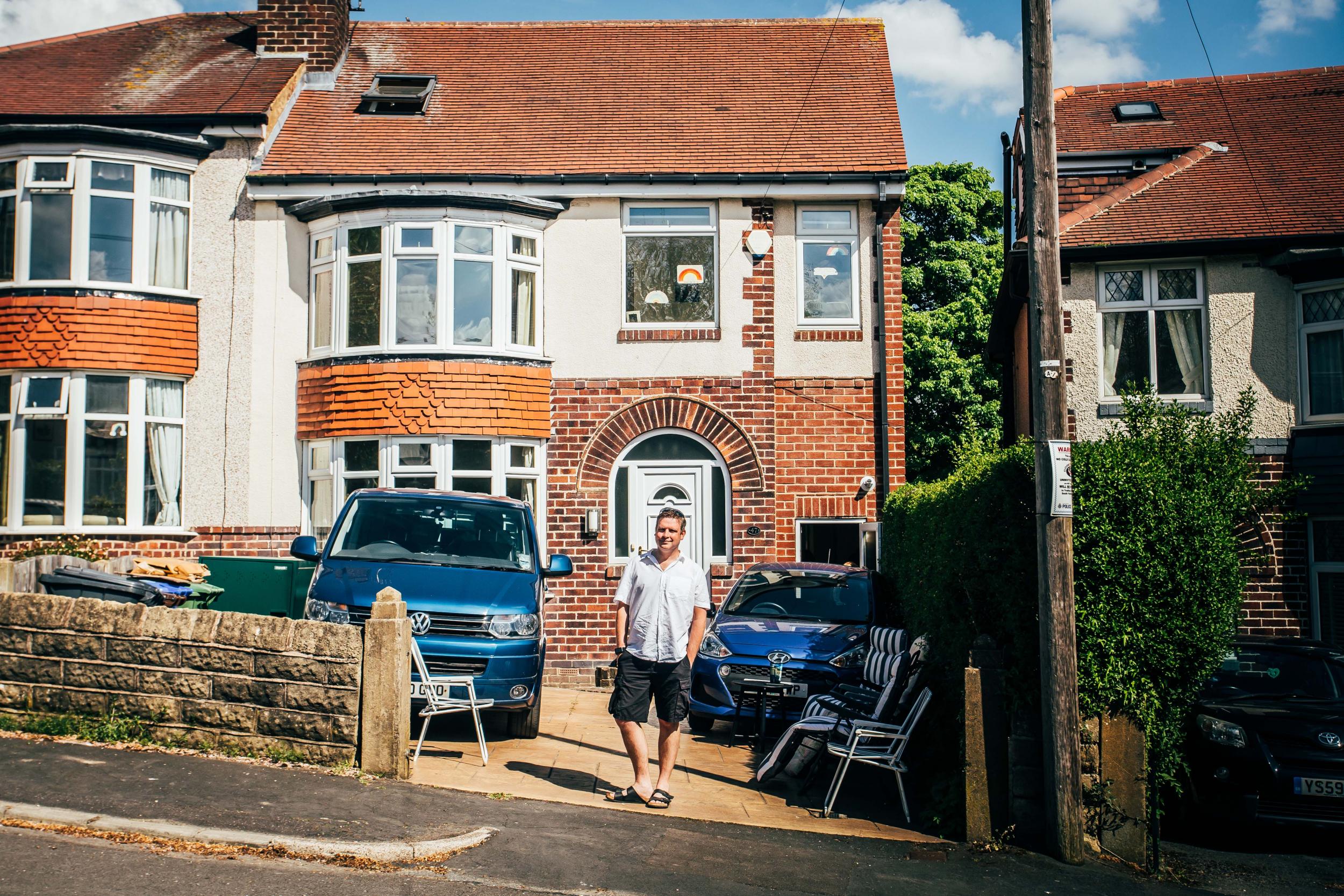
As coronavirus first swept the country in February, Dr Tim Meekings says he felt nothing short of a “sense of impending doom”.
As lead consultant for critical care at Chesterfield Royal Hospital (CRH), he was not only on the pandemic’s front line, he was the man charged with ensuring the town had enough intensive care beds.
“We were preparing for a tsunami,” the 45-year-old says. “We managed to increase capacity three-fold but when we saw what was happening in Italy…”
He trails off.
Amid fears of being overwhelmed, one question played on his mind above others: what if they couldn’t look after all patients coming in through the doors. “How do you ration care?” he asks. “How do you possibly decide who gets treatment?”
It never happened.
The lockdown meant admissions – which reached a peak of around 20 ventilated people at the start of April – slowed down. Lives were inevitably lost at CRH but the system held.
“It has been the hardest challenge of my life,” says the father to three teenagers today. “I’d get home and it was more difficult than being at work because, even though you need rest, you felt you should be back there helping. You couldn’t switch off.”
Was he not worried about contracting the illness himself? Not especially, it seems.
“We were fortunate to have all the PPE we needed,” he says. “To some extent being in intensive care units is safer than going into a Tesco Express because you are fully protected.”
In any case, even bigger challenges now lie ahead. Not just in dealing with a potential second peak but in reconfiguring the hospital to cope with what he believes will become a constant stream of infected patients.
“This isn’t going away,” he says. “Dealing with it immediately was, in some ways, the easy part: we just needed to ramp up capacity. The difficult bit comes now: how do you change your entire hospital so it can function normally while also dealing with coronavirus on a long-term basis? This is what we need to solve.”
The parents-of-six: ‘We’d lived here 13 years and never spoken to some neighbours – now we do’
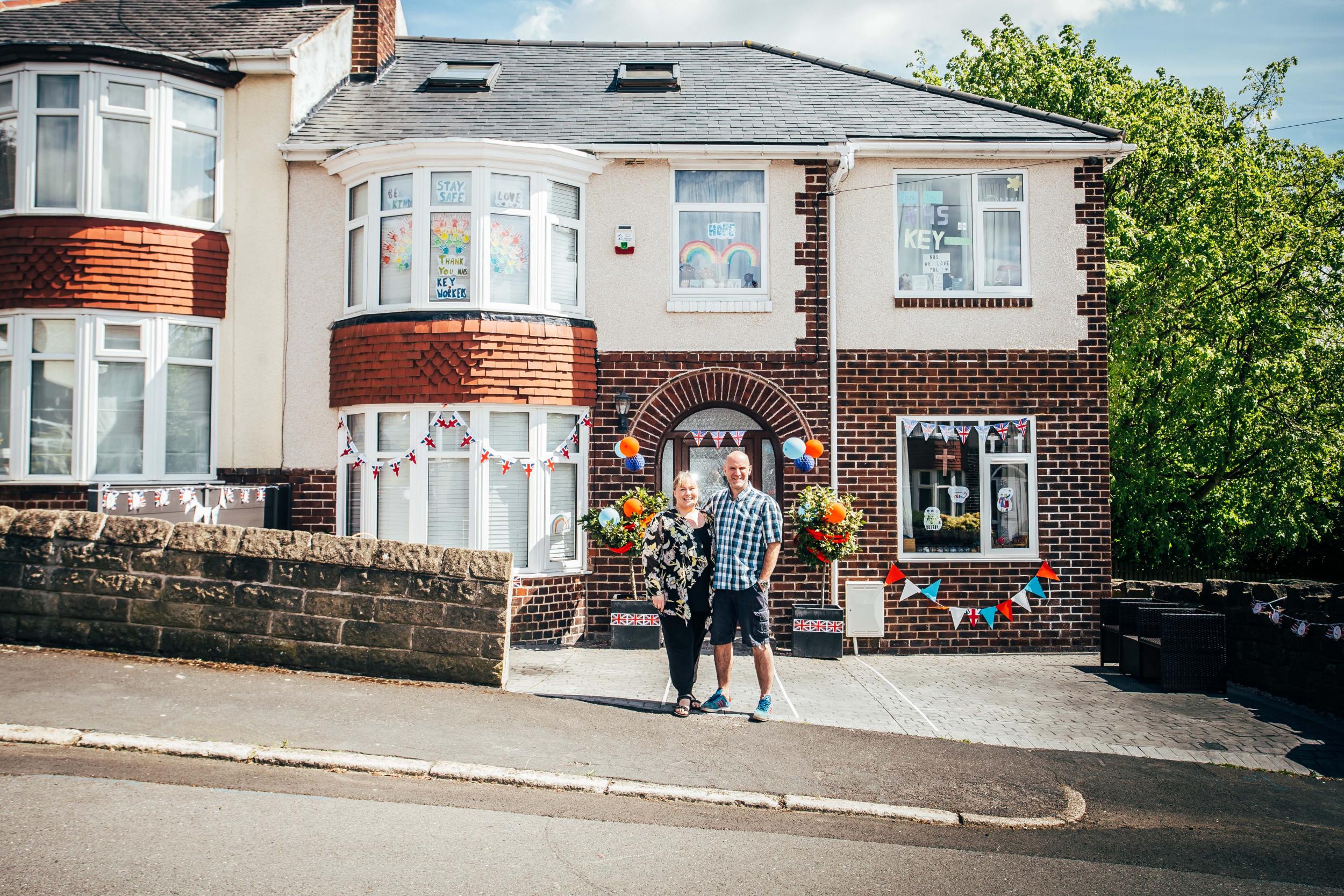
Midway through lockdown, Nina Churchus – a primary school teacher and mother-of-six – had the family making pamper packs for all the key workers on Lydgate Hall Crescent.
They put treats – including chocolates, face masks and bottles of beer – in bags, and then left them at the door of the street’s nurses, doctors and care workers. “It was just a way of saying thank you,” the 41-year-old explains.
She thinks a moment. “Quite expensive mind,” she adds. “I didn’t realise how many key workers were here.”
Such action appears to sum up the Churchus family – that’s Nina, husband Lee, 46, and their six youngsters, aged from four to 20.
Their home is adorned with rainbows, praise for the NHS and the family motto: “Be kind”. They organised the street’s WhatsApp group in which anyone struggling through lockdown could request help.
“It’s funny,” says Nina. “Before this, we’d lived here 13 years and never spoken to some neighbours – but that’s all changed now.”
It has been a dreadful crisis, notes Lee, a stay-at-home dad, but “that new community spirit is such a positive – hopefully that will remain long after the virus has gone”.
They, themselves, have found lockdown occasionally difficult with eight people in the house. They structure the days so home-schooling takes place in the morning and then creative and imaginative activities fill the afternoon. The family is currently working on a 1,000-piece jigsaw together.
They’ve also celebrated two birthdays during the restrictions. “For one of them, he’d wanted to go camping,” says Nina. “So, we did just that – only we set up a tent in the living room.”
The Chinese family: ‘You worry people will blame you’
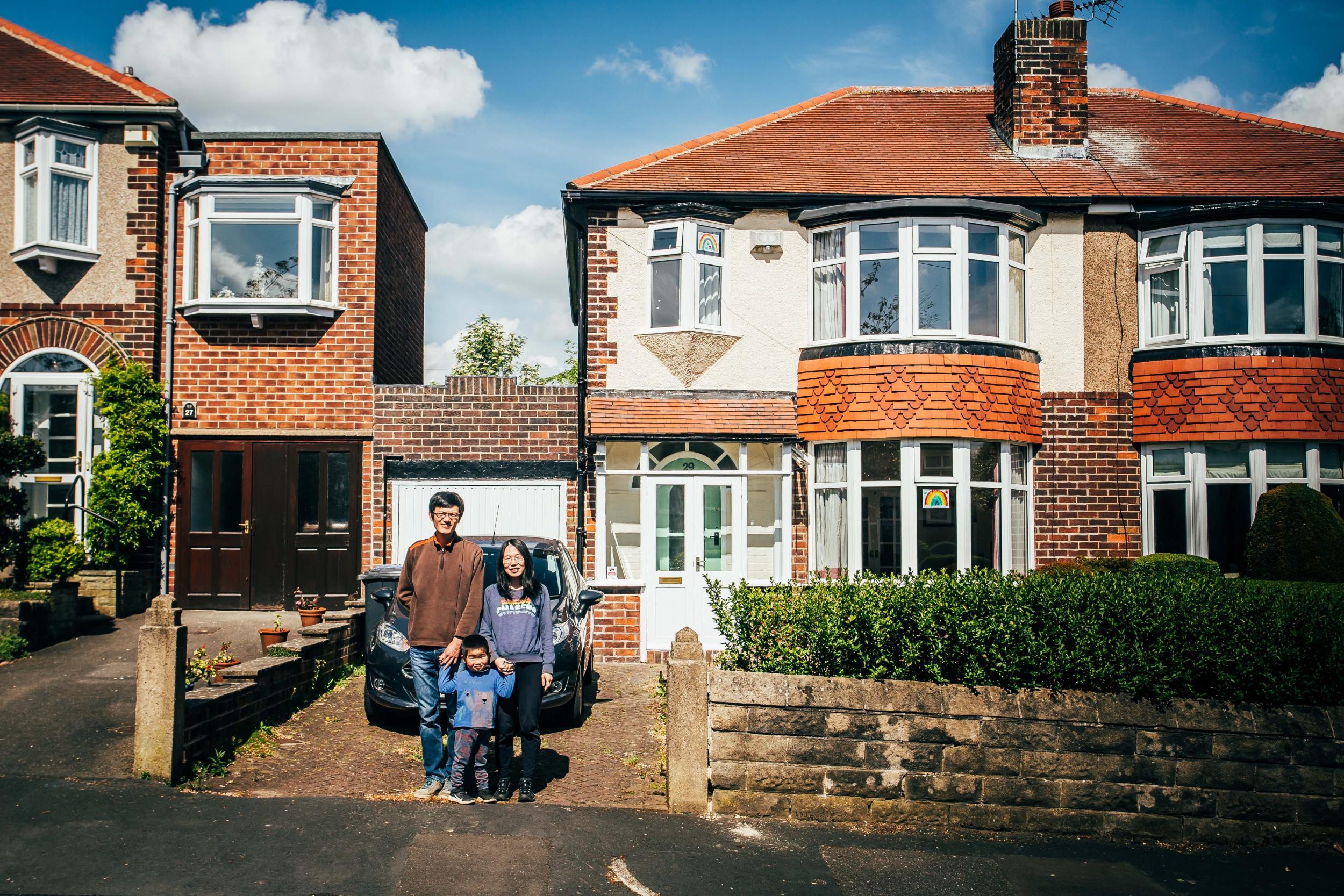
For Kai and Suo Zeng, the virus has brought two main concerns.
The first is that she is pregnant with their second child. “Apart from walks and scans, I haven’t been out since February,” she says. “I’m hoping things will be normal by the birth [in September] but it is difficult to know.”
The second is related to the fact they are from Shenzhen, in China.
Although they have been in the UK 11 years, the pair – who are both biology researchers at Sheffield University – worry about anti-Chinese sentiment. “It sounds far-fetched and we haven’t experienced anything at all so far,” says Kai, 40. “But then you hear Trump calling it the Chinese virus and you do worry that will catch on, that people will blame you.”
Although the couple – and three-year-old Jim – all owned face masks long before the coronavirus came into existence, Kai says he stopped wearing his for a short while as Covid-19 started to spread. “I didn’t want to draw more attention to myself,” he says. “It felt safer not wearing one.”
Largely, they say they have found lockdown relatively stress-free – “or as stress-free as it can be with a toddler”, notes Kai.
Either way, the couple’s sights are now firmly set on September. “The plan was for my parents to come over but perhaps this doesn’t happen now,” says 34-year-old Suo. “Even if travel is allowed, do we want them on a plane?”
They say they remain hopeful but, just for a moment, Suo looks downbeat: “Who knows when they will meet their new granddaughter?”
The great-grandparents: ‘How do you tell a two-year-old they can’t come into grandma’s house?’
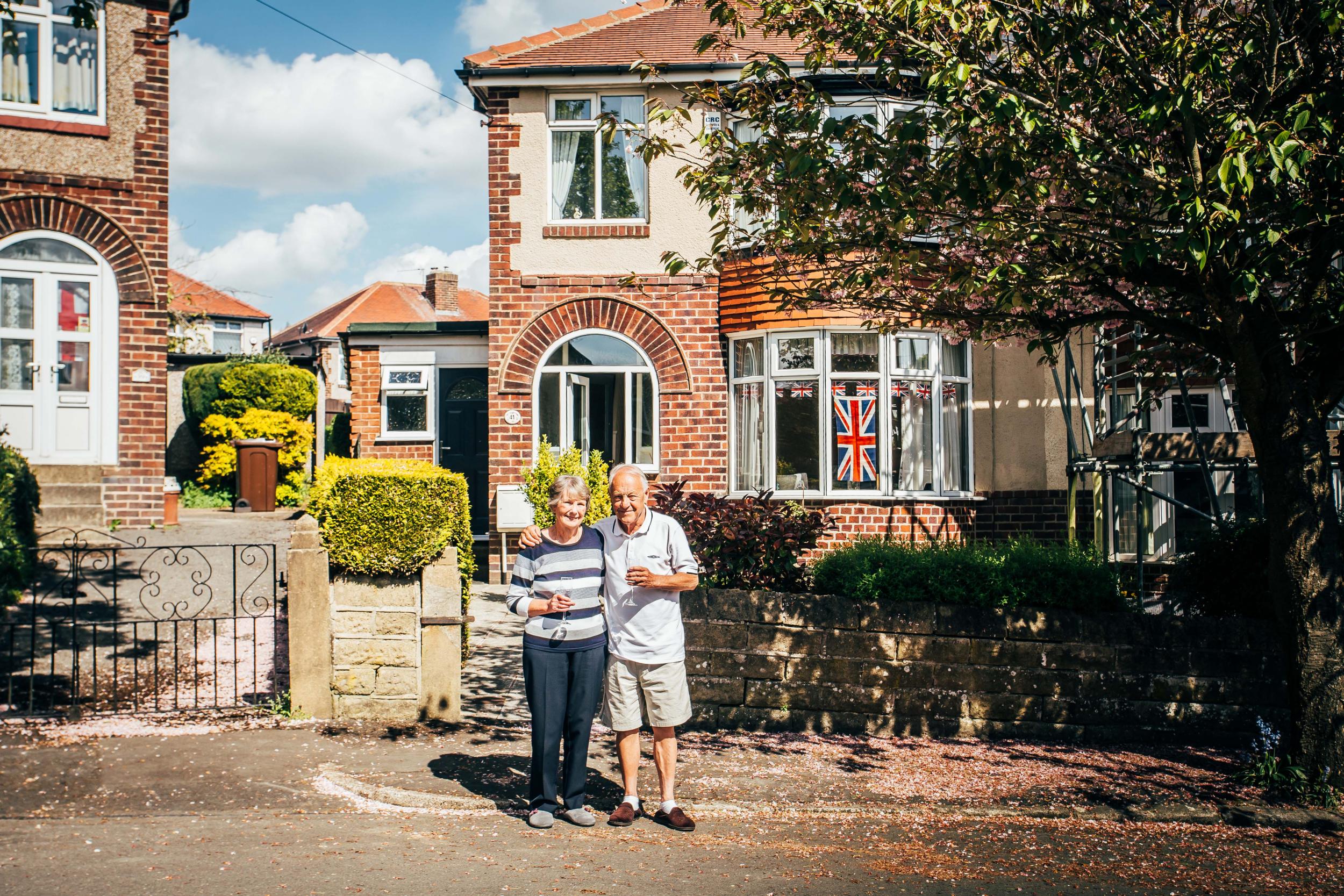
Aged 81 and 77, Tony and Margaret Tarrant are as active and social as they come. Or at least, they were until lockdown.
Their weeks were filled with trips to the nearby Peak District, visits to grandchildren and great-grandchildren, and pottering through Meadowhall shopping centre. Every Saturday night, they went for a pint at the nearby Sportsman pub.
“Well, there’s none of that anymore,” says Tony, a retired upholsterer. “We’ve barely been beyond the garden for eight weeks.”
Because of their age, the couple – who, between them, have survived two lots of cancer and a stroke – are shielding themselves. Shopping and medicine are brought by family and neighbours. Exercise is gardening. They have had a very occasional walk.
“I won’t grumble because, in this weather, I like to spend time in my garden anyway,” says Tony. “It could have been worse. It could have been raining throughout.”
All the same, not getting to see – or at least hug – their grandchildren has been tough, they say.
“Sometimes, when the family brings round shopping, we can speak to them across the garden,” says Margaret, a one-time seamstress who is drinking a glass of champagne to celebrate VE Day when The Independent speaks to her. “But the two-year-old was here the other day. How do you tell them they can’t come into grandma’s house? That was hard. That wasn’t easy.”
When this is over, will it have changed them in any way?
“Well, we should have a nicer garden,” winks Tony. “And I’ll certainly savour that first pint back in the pub.”
The doctor: ‘It’s probably a case of when not if I catch it – but this is my duty, you don’t run away from that’
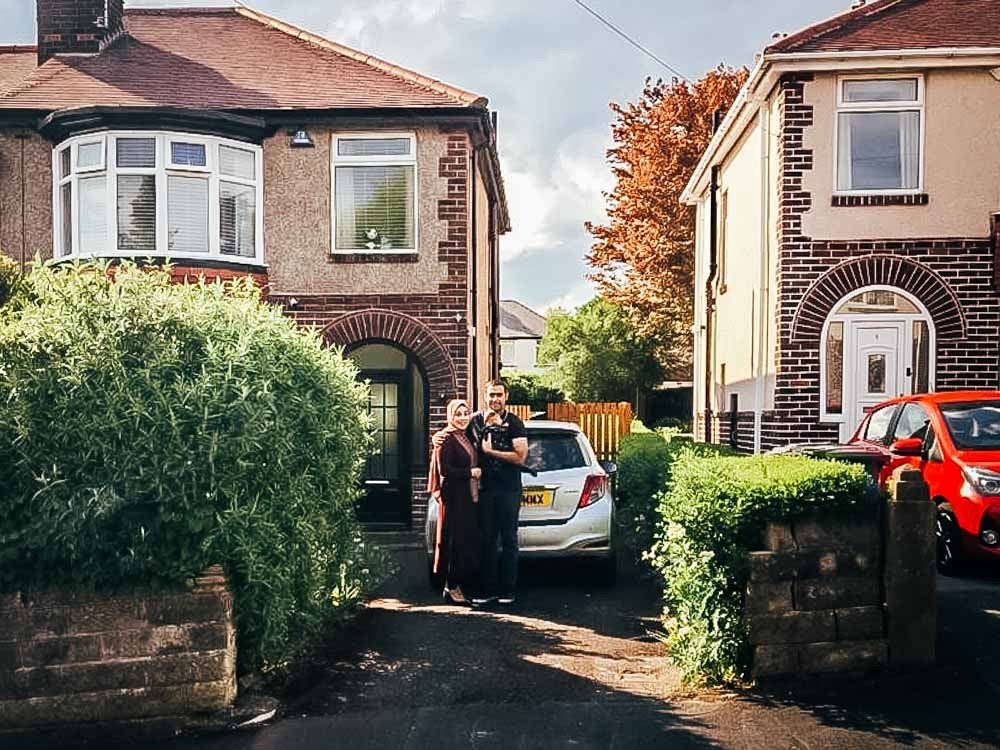
As a hospital doctor, Yaser Wahid needed no reminding how serious coronavirus was.
But when a colleague at Doncaster Royal Infirmary died from the infection in April, it truly brought home the dangers we all – and his profession in particular – face.
“He was a lovely man and a wonderful doctor,” the 29-year-old says. “It was devastating to lose him. You see the death figures and can sometimes forget that each one brings so much heartbreak.”
Yaser himself says he has accepted at some point he will probably catch Covid-19. He wears PPE when dealing with known or suspected coronavirus patients (“unbearably hot after 10 minutes”, he notes) but, as a doctor who works across several wards at several district hospitals, he reckons it’s probably inevitable he will contract the virus at some point.
“I think a lot of medics have come to the conclusion it’s probably when rather than whether we get it.”
Does that scare him? “It’s not ideal but this job is my duty. You don’t run away from that. You have to stand up and be counted.”
The added complication here may be that he and wife Salihah – a 30-year-old physician’s associate – have just had their first child, 10-week-old Haadi. “I get home and before I even go in the same room as them, I put my clothes in the wash and go for a shower,” he says. “Which is hard when you just want to the hug the kid.”
Their parents too – from Sheffield and Bradford – have found the lockdown hard.
Although they got to see their new grandchildren for a couple of weeks before restrictions were imposed, they have had to make do with FaceTime since.
“It’s Ramadan right now so this is really a time when we’d be seeing lots of them normally,” says Yaser. “It’s hard but perhaps we’re all guilty of taking friends and family for granted sometimes. Never again after all this.”
The A-level student: ‘I was ramping up revision when exams got pulled – if my teachers are reading’
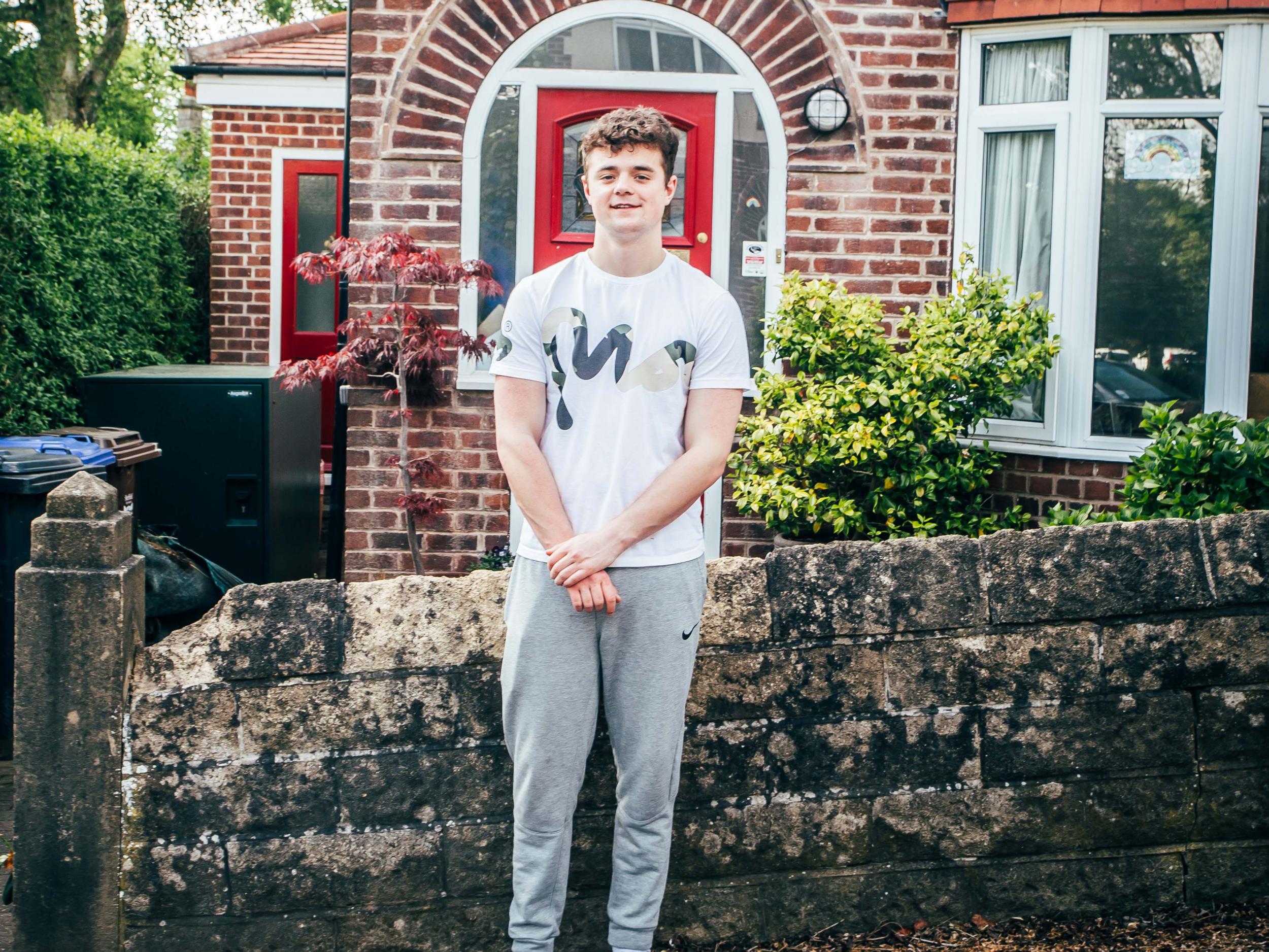
Alfie Bacon never thought he’d be glad to hear of cancelled exams.
But when, in March, it was announced his A-levels were to be pulled, he says he found himself surprisingly disappointed. “I’d probably not worked as hard as I should have done in the first year,” he says. “So my predicted grades maybe aren’t what I would have hoped for.”
He thinks for a moment. “If my teachers are reading this, I was ramping up revision. Maybe they could take that into account when grading me?”
The 18-year-old had been accepted to study sport and exercise at Leeds Trinity University in September but the pandemic has left that entirely uncertain.
“I don’t know if I’ll go,” he says. “I don’t even know if I want to anymore. It feels like everything is on pause at the moment.”
In the meantime, he’ll carry on his job as one of the country’s newly anointed heroes, a Tesco worker.
“I’ve been doing it since November,” he says. “It doesn’t feel any different now to back then. It’s just there’s face masks and gloves in the back now if anyone wants to wear them. Which most of us don’t.”
Doesn’t he feel it’s a high-risk job? “Maybe,” he shrugs. “But I’m pretty low-risk anyway. I’ll follow the rules on lockdown but I’m not going to let this dominate my whole way of thinking.”
As it happens, his mum and dad are both nurses. “I’m really proud of them,” he says. “But I always have been. It didn’t need a pandemic to make me realise they do a brilliant job. I guess it’s nice the rest of the country is finally realising.”
The would-be emigrants: ‘We were all set to move to the US – now that’s fallen through’

Earlier this month, Jason and Heather Capunitan should have been moving to California.
“So that’s fallen through,” says Heather, 36. “Now? We have our rescheduled embassy interview in June but who knows what will happen?”
The couple met in the US when Heather, from Rotherham, was introduced to Californian Jason while out there working for Sony.
They’ve lived back here for two years – and now have two children, Isaac, three, and Kaleb, 15 weeks – but they were set to make the permanent switch across the Atlantic at the start of this month.
“We’ll still do it,” says Heather. “But I don’t know when. The whole world feels so uncertain right now. It could be next year.”
Because Jason – a 39-year-old advertising operations manager – works from home anyway and Heather had finished work to look after the new arrival, neither says the lockdown has materially altered their situation too much.
They are lucky, they say, to have a big garden, and feel fortunate that Kaleb arrived before the pandemic began.
But, to all intents and purposes, they have gone, in the space of just a few short months, from having one child with full nursery and grandparental support to having two children with none of that. The resulting workload, they say, has been intense.
“I keep reading things about people being bored in lockdown,” says Heather. “Frankly, I’d love to be bored.”
She’s concerned that not going to nursery could have an impact on Isaac’s development (“you can see him getting frustrated being home all day”) and is worried that, in keeping him entertained, she is given less dedicated attention to Kaleb.
“But I think thousands of parents must be feeling the same at the moment, right?” she says. “We’re all in the same boat. And I think we’ll come out of this stronger. I think we’ll come out better parents.”
Join our commenting forum
Join thought-provoking conversations, follow other Independent readers and see their replies
0Comments